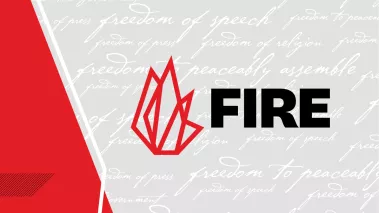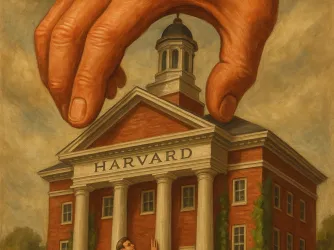Table of Contents
Victory for First Amendment: Nebraska Supreme Court exonerates student charged with 'Breach of the Peace' for two e-mails

In a victory for the First Amendment, the Nebraska Supreme Court has reversed a college student's conviction for breach of the peace for sending two anonymous e-mails to his professor.
In the e-mails, University of Nebraska student Darren Drahota had criticized the professor, who was also running for the state legislature at the time, for his political views and questioned his patriotism. The professor alerted the police to the e-mails, resulting in a conviction for disturbing the peace that was upheld on appeal by the Nebraska Court of Appeals. In its decision in State v. Drahota, the Nebraska Supreme Court overturned the conviction on First Amendment grounds and exonerated Drahota, who was represented by FIRE ally, renowned legal blogger and UCLA Law School professor Eugene Volokh. FIRE submitted an amicus (friend-of-the-court) brief in this case on behalf of Drahota.
Torch readers may recall that Drahota's case began with a heated political debate between himself and his political science professor, Bill Avery. Avery was also a candidate for the Nebraska Legislature at the time and is currently serving as a state senator. The two first shared their views during a prolonged e-mail exchange, after which Avery told Drahota that he no longer wished to continue the conversation. In two subsequent e-mails sent by Drahota from the anonymous e-mail address averylovesalqueda@yahoo.com, one of which contained the subject line "traitor," Drahota harshly criticized his professor's political views and sharply questioned his loyalty to the country. Avery alerted the police to the e-mails, who traced the e-mails to Drahota.
Drahota was then charged with, and convicted of, disturbing the peace under local law. The Nebraska Court of Appeals upheld this result on appeal, relying on a number of erroneous grounds to uphold Drahota's conviction, including that he used a libelous e-mail address. As FIRE's amicus brief argued, this finding was highly dubious, since the e-mail address was communicated only to Avery and did not reach a third party as is required under the law of libel.
Happily, Drahota has now been exonerated thanks to the work of Professor Volokh, who took on the case pro bono following Drahota's failed appeal and petitioned the Nebraska Supreme Court for review. Nebraska's highest state court has struck a blow for the First Amendment with today's decision. The ruling recognizes and upholds the right of citizens to engage in charged political discourse and debate, even when that debate is harsh, rude, unpleasant, anonymous, or unforgiving.
In its opinion, the Nebraska Supreme Court first overturned the state appellate court's holding that Drahota's e-mails constituted "fighting words," declaring that "the State cannot constitutionally criminalize speech ... solely because it inflicts emotional injury, annoys, offends, or angers another person." Distinguishing the case before it from the court's previous rulings, the court correctly concluded that Drahota's expression did not constitute fighting words because it was not likely to provoke an immediate breach of the peace:
We conclude that Drahota's e-mails are not fighting words and are distinguishable from Broadstone. The context of Drahota's speech was an ongoing political debate, not random obscenities directed at small children, which could likely provoke a response from nearby adults. Here, Drahota and Avery had corresponded for months on political issues. And both had made provocative statements during that dialog without incident. The First Amendment encourages robust political debate, particularly the right to criticize public officials and measures...
By the time Drahota sent the e-mails at issue, Avery was running for office. And we have stated that "[t]he steadfast rule is that '"in public debate our own citizens must tolerate insulting, and even outrageous, speech in order to provide adequate breathing space to the freedoms protected by the First Amendment."'" [Internal citation omitted.]
The court thus demonstrated its understanding that the "fighting words" doctrine should have an appropriately narrow scope:
[H]ere, even if a fact finder could conclude that in a face-to-face confrontation, Drahota's speech would have provoked an immediate retaliation, Avery could not have immediately retaliated. Avery did not know who sent the e-mails, let alone where to find the author. We conclude that the State has failed to show that Drahota's political speech constituted fighting words.
It's heartening to see the Nebraska Supreme Court take such a narrow approach to "fighting words," which FIRE long has argued is essentially dead-letter law as a matter of First Amendment doctrine.
In addition to correctly holding that the fighting words doctrine cannot be applied to restrict and punish speech such as Drahota's, the court expressly recognized that political expression is of particular importance to our republic:
[T]his case deals with political speech directed at a candidate for public office...."'The First Amendment affords the broadest protection to such political expression in order "to assure [the] unfettered interchange of ideas for the bringing about of political and social changes desired by the people." . . .'" The ability of a constituent to voice his concerns and opinions to his elected representatives, and to those who wish to become his representatives, is the cornerstone of republican government. We reject the State's contention that Drahota's mere sending of an e-mail constituted a breach of the peace because Avery had previously asked Drahota not to communicate again. [Internal citation omitted.]
The court therefore concluded:
Obviously, Drahota is not a wordsmith, and his bumper sticker rhetoric was certainly provocative. But it did not rise to the level of fighting words under these facts. If the First Amendment protects anything, it protects political speech and the right to disagree.
[...]
In closing, the hallmark of free speech protection is to allow the "'free trade in ideas'-even ideas that the overwhelming majority of people might find distasteful or discomforting." To criminalize Drahota's speech would impede the free flow of those ideas and political discussion between the people and their representatives. This we refuse to do. [Internal citation omitted.]
Well said. That, as much as anything, sums up Drahota's case and its import for advocates of free speech. I'm very happy to report that the Nebraska Supreme Court reached the correct outcome in this case; the result is a victory for anyone who cherishes the freedom of speech guaranteed by the First Amendment, on and off campus. Hopefully, the case will serve as a reminder to all of the broad scope of the First Amendment's protections.
Recent Articles
FIRE’s award-winning Newsdesk covers the free speech news you need to stay informed.

FAQ: Responding to common questions about the fight between Harvard and the Trump administration

George Mason University calls cops on student for article criticizing Trump

Trump administration's coercion at Columbia is unlawful and unconstitutional
